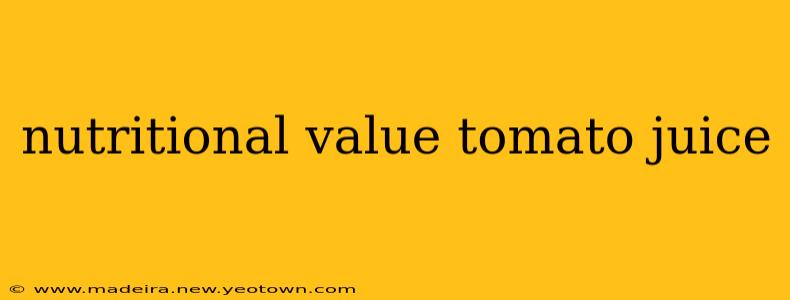Forget the cliché of tomato juice as a mere hangover cure; it's time to recognize this vibrant beverage for its surprising nutritional wealth. Packed with vitamins, minerals, and antioxidants, tomato juice offers a delicious and convenient way to boost your health. This isn't just your average breakfast juice; let's delve into the fascinating world of tomato juice and discover why it deserves a prominent place in your diet.
What Vitamins and Minerals Are in Tomato Juice?
Tomato juice is a surprisingly rich source of essential nutrients. Let's start with the powerhouse vitamin C, a crucial antioxidant that strengthens your immune system and protects your cells from damage. Beyond vitamin C, you'll find a good dose of vitamin K, vital for blood clotting and bone health. Potassium, an electrolyte essential for maintaining fluid balance and nerve function, is also present in significant amounts. And don't forget vitamin A, crucial for vision and cell growth, and folate, important for cell division and DNA synthesis. The list doesn't end there; tomato juice also contains smaller amounts of other B vitamins and minerals like magnesium and manganese.
Is Tomato Juice Good for You? What Are the Health Benefits?
The nutritional profile of tomato juice translates to a range of potential health benefits. The high concentration of lycopene, a powerful carotenoid antioxidant, is particularly noteworthy. Lycopene is linked to a reduced risk of several chronic diseases, including heart disease and certain cancers. Studies suggest that the lycopene in tomato juice may also help protect against sun damage and improve skin health. The potassium content contributes to healthy blood pressure levels, while the fiber aids digestion. Furthermore, the antioxidants in tomato juice help combat inflammation, a factor in many chronic diseases.
How Many Calories Are in Tomato Juice?
The calorie content of tomato juice can vary depending on the brand and whether it's low-sodium or contains added sugars. Generally, a single serving (around 8 ounces) contains between 25 and 40 calories. However, it's crucial to check the nutrition label as some brands might add significant amounts of sugar or salt, significantly altering the calorie and sodium content. Opting for low-sodium or no-salt-added varieties is recommended to reap the maximum health benefits without excess sodium.
Is Tomato Juice Good for Weight Loss?
Because of its relatively low calorie count and high nutrient density, tomato juice can be a part of a healthy weight-loss strategy. However, it's vital to remember that weight loss is a holistic process involving diet and exercise. While tomato juice can contribute to your daily nutrient intake without adding excessive calories, it shouldn't be considered a magic bullet. It's best enjoyed as part of a balanced, calorie-controlled diet.
What Are the Potential Downsides of Drinking Tomato Juice?
While generally beneficial, tomato juice does have a few potential downsides. Individuals with acid reflux may find that the acidity of tomato juice exacerbates their symptoms. Those sensitive to oxalates might experience issues, as tomatoes contain these compounds, which can contribute to kidney stone formation in susceptible individuals. Finally, while naturally low in sodium, many commercially available tomato juices contain added salt, which can be a concern for people watching their sodium intake. Always opt for low-sodium or no-salt-added options.
Conclusion: A Delicious and Nutritious Addition to Your Diet
In conclusion, tomato juice offers a surprisingly potent nutritional punch, packed with vitamins, minerals, and antioxidants. From boosting your immune system to protecting against chronic diseases, the health benefits are numerous. While there are some potential drawbacks, choosing low-sodium varieties and enjoying it as part of a balanced diet can significantly enhance your overall well-being. So, next time you're looking for a refreshing and nutritious beverage, remember the humble but powerful tomato juice.

